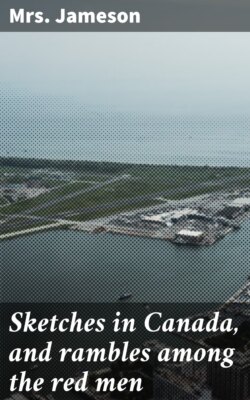Читать книгу Sketches in Canada, and rambles among the red men - Mrs. (Anna) Jameson - Страница 25
На сайте Литреса книга снята с продажи.
NIAGARA IN SUMMER.
ОглавлениеTable of Contents
Between the town of Queenston and the cataract of Niagara lies the pretty little village of Stamford (close to Lundy Lane, the site of a famous battle in the last war), and celebrated for its fine air. Near it is a beautiful house with its domain, called Stamford Park, built and laid out by a former governor (Sir Peregrine Maitland). It is the only place I saw in Upper Canada combining our ideas of an elegant, well-furnished English villa and ornamented grounds, with some of the grandest and wildest features of the forest scene. It enchanted me altogether. From the lawn before the house, an open glade, commanding a park-like range of broken and undulating ground and wooded valleys, displayed beyond them the wide expanse of Lake Ontario, even the Toronto light-house, at a distance of thirty miles, being frequently visible to the naked eye. By the hostess of this charming seat I was conveyed in a light pony carriage to the hotel at the Falls, and left, with real kindness, to follow my own devices. The moment I was alone, I hurried down to the Table-rock. The body of water was more full and tremendous than in the winter. The spray rose, densely falling again in thick showers, and behind those rolling volumes of vapour the last gleams of the evening light shone in lurid brightness, amid amber and crimson clouds; on the other side, night was rapidly coming on, and all was black, impenetrable gloom, and "boundless contiguity of shade." It was very, very beautiful, and strangely awful too! For now it was late, and as I stood there, lost in a thousand reveries, there was no human being near, no light but that reflected from the leaping, whirling foam; and in spite of the deep-voiced continuous thunder of the cataract, there was such a stillness that I could hear my own heart's pulse throb—or did I mistake feeling for hearing?—so I strayed homewards, or housewards I should say, through the leafy, gloomy, pathways,—wet with the spray, and fairly tired out.
The good people, travellers, describers, poets, and others, who seem to have hunted through the dictionary for words in which to depict these cataracts under every aspect, have never said enough of the rapids above—even for which reason, perhaps, they have struck me the more; not that any words in any language would have prepared me for what I now feel in this wondrous scene. Standing to-day on the banks above the Crescent Fall, near Mr. Street's mill, gazing on the rapids, they left in my fancy two impressions which seldom meet together,—that of the sublime and terrible, and that of the elegant and graceful—like a tiger at play. I could not withdraw my eyes; it was like a fascination.
The verge of the rapids is considerably above the eye; the whole mighty river comes rushing over the brow of a hill, and as you look up, it seems coming down to overwhelm you. Then meeting with the rocks, as it pours down the declivity, it boils and frets like the breakers of the ocean. Huge mounds of water, smooth, transparent, and gleaming like the emerald, or rather like the more delicate hue of the chrysopaz, rise up and bound over some unseen impediment, then break into silver foam, which leaps into the air in the most graceful fantastic forms; and so it rushes on, whirling, boiling, dancing, sparkling along, with a playful impatience, rather than overwhelming fury, rejoicing as if escaped from bondage, rather than raging in angry might,—wildly, magnificently beautiful! The idea, too, of the immediate danger, the consciousness that anything caught within its verge is inevitably hurried to a swift destination, swallowed up, annihilated, thrills the blood; the immensity of the picture, spreading a mile at least each way, and framed in by the interminable forests, adds to the feeling of grandeur; while the giddy, infinite motion of the headlong waters, dancing and leaping, and revelling and roaring, in their mad glee, gave me a sensation of rapturous terror, and at last caused a tension of the nerves in my head, which obliged me to turn away.
The great ocean, when thus agitated by conflicting winds or opposing rocks, is a more tremendous thing, but it is merely tremendous,—it makes us think of our prayers; whereas, while I was looking on these rapids, beauty and terror, and power and joy, were blended, and so thoroughly, that even while I trembled and admired, I could have burst into a wild laugh, and joined the dancing billows in their glorious, fearful mirth,—
